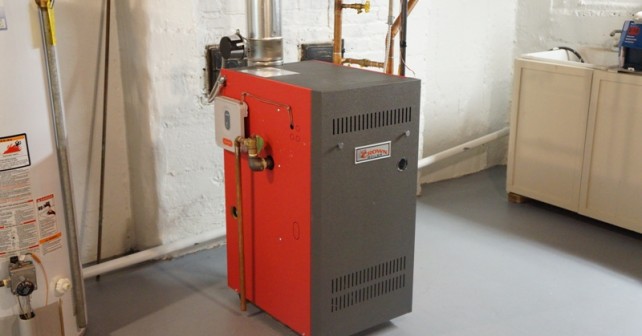
Summer is over and winter is here. I am sure right now heating your home is the last thing you are thinking about, but you should be. Especially if you know your boiler or furnace is on its last leg. Okay so what's this all about and what are we going to cover in this review?
This won't be our only review of this boiler. Boilers are a big expense. The unit costs money and the install costs money. So we understand making a change is a big deal. We are going to be doing on going reviews of this unit to keep you updated on how it has held up over time. We will be releasing another review in the middle of winter, the end of winter and as years go on regarding this boiler. Here's what we won't cover, installing the boiler. Boilers aren't that hard to install, but you are dealing with gas and electricity so our lawyers advised us not to cover that aspect. Okay we don't have lawyers, but I think you understand. We do recommend using a trained professional who deals with HVAC to install your boiler for you. For this install I used a good friend, Steve with Lazco Industries. Main reason is because he knows what he is doing, he offers competitive pricing and does an awesome job. Now I know other HVAC guys, but for my house, this is the guy I trust. In fact, he was the one who recommended a three zone system. After installing the unit and having three zones, all I can say is it was an awesome recommendation. He also told me about some others things I should and shouldn't do with the system, which ended up saving me money.
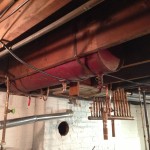
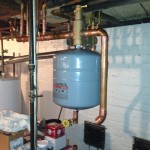
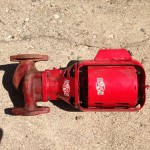
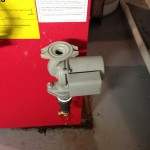
Old Expansion Tank New Expansion Tank Old Pump New Pump
So why are we dealing with a gas fired hot water heat boiler? Two reasons. First, that's what is currently installed in the house and secondly, I think a hot water boiler system is much nicer than forced air. With forced air you get cold spots in the house. With a hot water boiler, it radiates the heat and you get a much nicer and more comfortable heat in the house. Plus with a boiler system, you can heat your floor or make your household hot water with the addition of an indirect water heater.
So here we are, we're going to replace our boiler. Once a boiler is installed, it's pretty much there to stay. It's not like a picture frame where you can just replace it or move it somewhere else. So when you decide to replace your boiler, you want to make sure you go with a quality boiler and a company that has been around for a while. I did a lot of research on boilers and could have picked from a couple different manufacturers, but I decided that Crown would be the best fit.
Crown Boiler Co is not new to the boiler market. In fact their roots date back to 1949 and they have been a leader ever since. One thing I really like about Crown is their product line. They offer a wide range of products, but not too many where they lose focus of their overall strength. They offer both residential and commercial gas and oil fired cast iron boilers, as well as stainless steel indirect water heaters, hydronic air handlers and warm air furnaces.
Some companies have cool mission statements, but it doesn't mean anything if they don't live by the statement. Crown seems to live by their guiding principles which are delivering quality products with outstanding customer service at competitive pricing. Just ask someone who owns a Crown product and I am sure they will agree.
I went with the Aruba 4 which is their premium residential gas boiler, it's the workhorse. Before I go on to talk about the boiler I want to cover one thing you should always be aware of before you buy a boiler and that is BTU's. If you have an older boiler, chances are your boiler could be over-sized, I know the one we are replacing is over-sized. When talking with Steve he also indicated the same thing. It is a good idea to have your HVAC contractor do a heat loss calculation for your home so that the proper size boiler can be chosen. That's what I did and found out my old boiler was 160,000 BTU input and has a 128,000 heating capacity which is over-sized for the size of the house. In essence I was throwing money out the vent every time the boiler ran. Crown has eight sizes to pick from ranging from 38,000 to 280,000 BTU Input. The new boiler we are installing has an input of 140,000 and output of 117,000 BTU's which is a better fit for the heat loss of the home.
Now that I got that out of the way, let's talk about the Aruba 4. As I said this is their workhorse or premium boiler they offer for the residential customer. Crown designed this for reliability, efficiency and performance, three key words I like. The reason I like this model is because of a couple key features. First, is the cast iron heat exchanger, well when we were taking it down the stairs, I wasn't too up on the cast iron idea because it's heavy. One thing to note is the heat exchanger comes with a lifetime limited warranty. For long term use and reliability, cast iron is the way to go. The unit also has an additional circulator output for a second heating zone or for an indirect water heater. This way if I ever want to convert my hot water heater, I am already set up.
A couple other features that someone with limited space might appreciate is the controls of the unit are located inside the powder coated steel jacket and you can easily access the control from the front of the boiler. The integrated boiler control with temperature control, relay and ignition functions are all on a single control module. The piping is located on the right side of the unit, but a technician can easily convert the piping to the left side while they are in the field. Another key feature for limited space is the built in rear draft diverter to allow the unit to fit into tight spaces.
For those who want a little more of their unit, you can also buy upgrades to this unit such as:
- 24 volt low water cutoff
- Docking station that accepts plug in modules for
- Low water cutoff
- Outdoor temperature reset
- Redundant high limit
When the unit arrived, it came packaged in a nice wooden crate to help protect it from shipping damage. The unit was also fully assembled and ready to install. We brought it downstairs, took the old unit off, replaced some old piping and installed the new boiler. Sounds easy doesn't it? Well actually it was, well at least for me since I really didn't do any of the work. Steve from Lazco Industries really did all the work. Steve is one of those guys you wish all your contractors were like. He is very professional, knows his systems inside and ou





